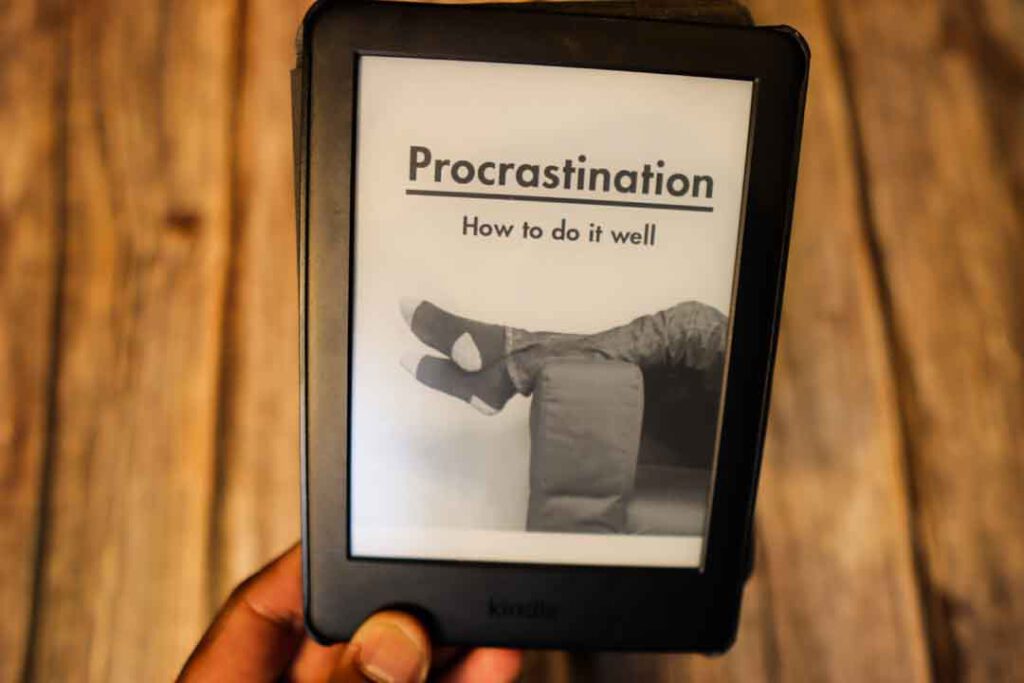
Editors Forward:
Rating: 3 Stars
A Manual to Managing Procrastination
Many of us are quiet geniuses at the art of procrastination. We tend to feel so guilty about everything we haven’t done yet (and the hours frittered away as though we were immortal), we never get around to reflecting on why we delay and how we might do so less often. It seems as if we have procrastinated too much to deserve a new start.
The book boils down in to 6 ideas on how to beat procrastination
Outwitting Procrastination:
1. One way to break paralysis around an unpleasant task is to introduce an even more unpleasant task, by comparison to which the first task starts to seem more appealing. A good way to start work on a tedious report is, therefore, to raise the spectre of a long-delayed thank-you letter or phone call to a tedious but kindly relative.
2. Work offline as much as possible; the internet is – plainly – the enemy.
3. Use an egg timer: work for fifteen minutes and not a moment more. If that doesn’t help, try five minutes. Humiliate yourself into finding a unit of time you can stick to. It might be only a minute and a half. It often is.
4. Use starkly accurate working titles for your efforts: ‘First Rubbish Version’; ‘Second Marginally Less Rubbish Version’; ‘Initial Pathetic Sketch’. Don’t expect it to be right for a long time. If ever.
5. Break a task into 100 sections. Note what percentage is done. For a 1,500-word report, every sentence is pretty much 1%.
6. Take a shower, go for a drive. We often have our best ideas when theoretically we’re not supposed to be working at all. The mind is so scared of thinking, it tends to wait to let out its more valuable thoughts until we are on a break.
Quotes and Personal Highlights
A big part of philosophy is asking yourself why you feel what you do: why am I upset? What’s really been bothering me? Who has upset me? This isn’t just something children can do-it’s something a lot of adults should spend a bit more time on as well. Because the better you know your feelings, the more easily you can explain what you’re going through.
Honoré de Balzac was one of the most productive writers of the nineteenth century, turning out several novels every year for more than two decades. In order to squeeze such an achievement out of himself, he developed an exceptionally eccentric working routine. He couldn’t normally write during the day, so he would sleep during the morning and again in the evening and get up around 1 am. He put on a large monastic robe with a hood and wrote through the hours of darkness – often until around eight in the morning. As he worked, he drank around fifty cups of coffee (mixed with chocolate and brandy; this had an immense effect on his brain: ‘Ideas quick-march into motion like battalions of a grand army’).
Painfully – but productively – what we need to do is to create deadlines for ourselves. We need to become our own inner bosses. Furthermore, we have to tell others about our intentions and figuratively sign them up to expect a specific amount of progress from us by a particular date. We have to invite a degree of nagging from people with no prior interest in delivering it – because this is better than the alternative: wasting our lives. Finally, we need to keep the ultimate deadline always in mind, perhaps by positioning a skull or an X-ray of a cancerous pancreas prominently on our desks.
Procrastination isn’t merely a delay; it’s a symptom of not recognising that we humans have to choose and always lose out through choice.